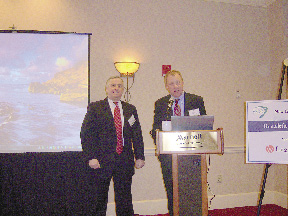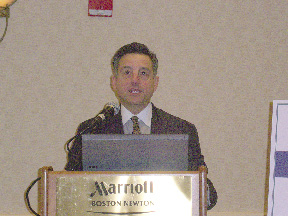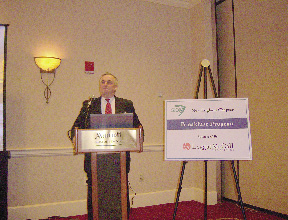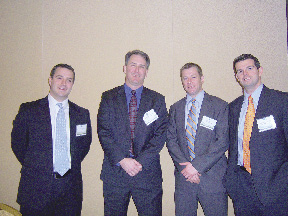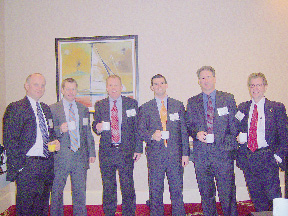The New England SIOR Chapter kicked off 2011 with its first breakfast meeting for its members and guests on Tuesday, February 15 at the Newton Marriott. Approximately 35 SIORs, Candidates and guests came to discuss upcoming Chapter events, plan additional programming ideas and discuss industry issues. Greg Klemmer, past Chapter president, introduced Tom Farrelly for his first inaugural appearance to the Chapter as the 2011 Chapter president. Farrelly thanked Klemmer for his outstanding work as past chapter president and for growing the chapter membership.
Even with the last two years as a downturn in the economy both the SIOR National and the New England Chapter have maintained their membership without a net loss. Farrelly felt that membership truly perceived value in the SIOR designation and the value of the conventions with education and networking opportunities. He stated that he is often questioned why he maintains his designation when he has the benefits of working at a major national firm. Farrelly told the audience that Cushman & Wakefield holds two national brokerage symposiums for the top brokers at Cushman with high level educational programming. These symposiums are expensive for the company but vital for brokerage growth. He then stated that the SIOR National Conventions are "right there" in terms of matching the quality and value of the Cushman & Wakefield symposiums. He also feels that at the SIOR conventions he is able to learn how mid and small market companies compete and the value that they bring to assignments that he may have overlooked in his presentations.
During 2011, as the new Chapter president, Farrelly wants to continue the efforts of Greg Klemmer with membership development and target young "up and coming" commercial brokers and wants to focus on female brokers for membership. There is a void in the Chapter with female members except for Kathy Kane, SIOR. Farrellyt wants to invite qualified candidates who are female commercial brokers to SIOR Chapter events. Over the last couple of years, the Chapter has reached out to NEWIRE and has held joint events at Hotel Indigo in Newton.
Farrelly thanked Don Mancini with his newest leadership position as programs director. Mancini organized the event at the Newton Marriott and designed new SIOR name tags with the SIOR logo. The program was then open for discussion on industry trend issues. Mancini took the podium to discuss a worthwhile energy upgrade construction tax benefit known as 179D Federal Energy Tax Deduction. An owner can take up to $1.80 per s/f for any upgrades to energy efficiency and can amend returns going back three years. This tax deduction is part of the recent tax legislation passed in the last year. It is a deduction and not a credit. Non-profit organizations do not qualify but the architect or contractor for a non-profit does qualify. If an owner renovates and improves the HVAC, there can be a partial deduction. The minimum deduction is $0.40 per s/f and the maximum deduction caps out at $1.80 per s/f. The cost to study energy upgrades and qualifying for the deduction can range from $0.05 - $0.10 per s/f. Mancini concluded that for the deduction to be worthwhile in terms of the cost invested, a building should be 20,000 s/f or larger in size.
Farrelly then invited Rob Nahigian to update the attendees on Mass. CE courses and his attendance last week at a CRE Chapter event on the U.S. economy and commercial real estate. Nahigian mentioned that he has been working with the Mass. licensing board and its Education Subcommittee as a volunteer for CBA for the last 1½ years. He has been drafting new commercial courses that could be approved and expand the offerings to commercial real estate brokers. As of date, the new courses approved included: Commercial RE Transactions, Commercial RE Loan Packages, Green and Sustainability, Professional Ethics for Residential and Commercial Brokers, Anatomy of the Commercial Building and Advanced Industrial RE. He has another six commercial modules that will be reviewed in the coming months.
Nahigian then opened the discussion with an overview of the 2010 Market Review and his take on 2011. Ray Torto, CRE last week at a CRE Chapter event stated that in 2010, the economy was in need of an organ transplant or what he called the Lehman Trauma. The economy was on life-support and now has indeed received the new organ. But the body cannot survive eating and drinking like it has in the past. Old behavior would need to change and the question becomes, "Will we change our behavior and how?" Nahighan's research has also unveiled that there was $4.5 trillion stashed in money market funds a few years ago and now we have $2.9 trillion. Some of the decrease is a result of paying off old debt from old consumption and some of the funds have been reinvested. Torto also stated there is an appetite to get back into real estate investments but the first tier of core properties has been purchased. So there is more risk being taken as "value-added" properties are being bought. Soon this second tier will be absorbed forcing investors to evaluate the "opportunity" real estate, a higher risk tier. Many investors are seeking appreciation as rents have decreased by 40% and stabilized. Torto also feels that rents in the Boston market will start to increase. The feeling is that there is another four years before we are back to full strength.
Nahigian also questioned the economy's health long-term with a $14 trillion economy and a $14 trillion debt. China has also grown to become the second largest economy in the world and is catching up to the U.S. And finally the topic of inflation and interest rates. There is one camp of experts who believe that higher interest rates are inevitable while fed chair Bernake and Dr. Gary Shilling in his recent book "The Age of Deleveraging" suggest no inflation. In fact, Dr. Shilling predicts lower prices and lower interest rates for the next four to five years. The question then becomes, "Where does an investor invest?" Real estate is supposed to be an inflation-hedge but if there is no inflation then why invest in real estate? Nahigian's quick response was safety of owning "bricks and mortar" and appreciation due to rising NOI rather than due to a lowering of cap rates.
Klemmer then surveyed the audience for new ideas for upcoming Chapter programming for 2011. The ideas fielded include:
1. Have speakers who are real estate directors of corporations/tenants and to be informed on the demand side of real estate.
2. Have construction topics and include architects or contractors on building costs, TI costs, etc.
3. Have a lawyer discuss new commercial lease clause issues
4. Have a speaker inform and update the Chapter on the 2013 projected changes with FASB 13, GAAP, IFRS and operating v. capital leases.
5. Have a speaker from Fantini & Gorga on financing
6. Have a lawyer educate the chapter on the permitting process and pitfalls of commercial projects both urban and suburban.
Klemmer then closed out the meeting by reminding everyone about March 24 and the next Chapter meeting set for April 26. Farrelly also reminded the attendees that the next SIOR convention is set for May 5-7 in Scottsdale, AZ. Registration has already commenced at www.siorcre.com.








